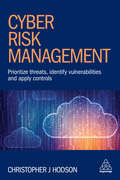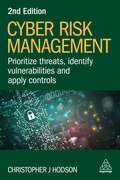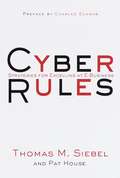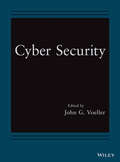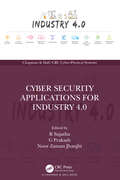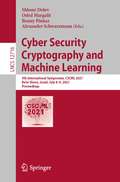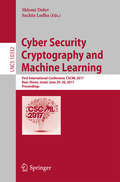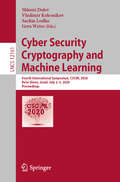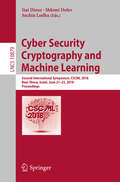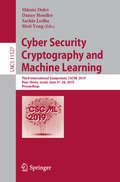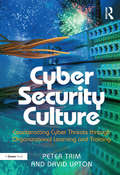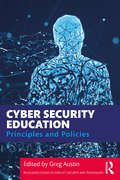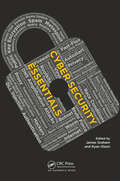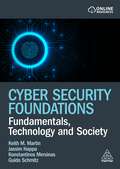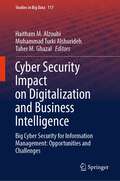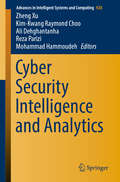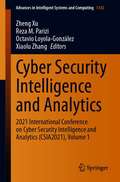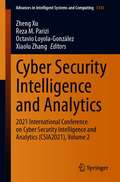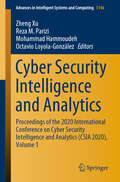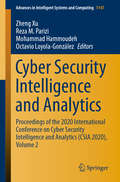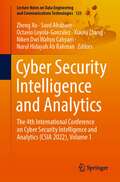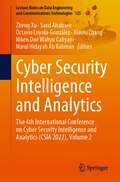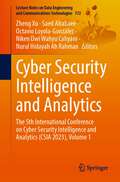- Table View
- List View
Cyber Risk Management: Prioritize Threats, Identify Vulnerabilities and Apply Controls
by Christopher HodsonMost organizations are undergoing a digital transformation of some sort and are looking to embrace innovative technology, but new ways of doing business inevitably lead to new threats which can cause irreparable financial, operational and reputational damage. In an increasingly punitive regulatory climate, organizations are also under pressure to be more accountable and compliant. Cyber Risk Management clearly explains the importance of implementing a cyber security strategy and provides practical guidance for those responsible for managing threat events, vulnerabilities and controls, including malware, data leakage, insider threat and Denial-of-Service. Examples and use cases including Yahoo, Facebook and TalkTalk, add context throughout and emphasize the importance of communicating security and risk effectively, while implementation review checklists bring together key points at the end of each chapter. Cyber Risk Management analyzes the innate human factors around risk and how they affect cyber awareness and employee training, along with the need to assess the risks posed by third parties. Including an introduction to threat modelling, this book presents a data-centric approach to cyber risk management based on business impact assessments, data classification, data flow modelling and assessing return on investment. It covers pressing developments in artificial intelligence, machine learning, big data and cloud mobility, and includes advice on responding to risks which are applicable for the environment and not just based on media sensationalism.
Cyber Risk Management: Prioritize Threats, Identify Vulnerabilities and Apply Controls
by Christopher J HodsonHow can you manage the complex threats that can cause financial, operational and reputational damage to the business? This practical guide shows how to implement a successful cyber security programme. The second edition of Cyber Risk Management covers the latest developments in cyber security for those responsible for managing threat events, vulnerabilities and controls. These include the impact of Web3 and the metaverse on cyber security, supply-chain security in the gig economy and exploration of the global, macroeconomic conditions that affect strategies. It explains how COVID-19 and remote working changed the cybersecurity landscape.Cyber Risk Management presents a data-centric approach to cyber risk management based on business impact assessments, data classification, data flow modelling and assessing return on investment. It covers pressing developments in artificial intelligence, machine learning, big data and cloud mobility, and includes advice on dealing with malware, data leakage, insider threat and Denial-of-Service. With analysis on the innate human factors affecting cyber risk and awareness and the importance of communicating security effectively, this book is essential reading for all risk and cybersecurity professionals.
Cyber Risks for Business Professionals
by Rupert KendrickRealise the benefits of Internet technologies, while ensuring your company is protected from the associated risks!An effective risk management strategy is vital to your company's survival Internet technologies have revolutionised the way that business is conducted. However, these innovations expose your business to various risks. Inadequate security can lead to the theft of customer data and, in the event of technological failure or a cyberattack, your business could lose its ability to function altogether. An effective risk management strategy is, therefore, vital to your company's survival. Understand the origins of cyber risks and develop suitable strategies for their management Cyber Risks for Business Professionals: A Management Guide is a general guide to the origins of cyber risks and to developing suitable strategies for their management. It provides a breakdown of the main risks involved and shows you how to manage them. Covering the relevant legislation on information security and data protection, the author combines his legal expertise with a solid, practical grasp of the latest developments in IT to offer a comprehensive overview of a highly complex subject. Expert guidance examining the operational and technological risks Drawing on interviews with experts from Clifford Chance, Capgemini and Morgan Stanley amongst others, the book examines the operational and technological risks alongside the legal and compliance issues. This book will be invaluable to lawyers and accountants, as well as to company directors and business professionals. Benefits to business include: * Understand and manage the technological risks This book looks at the security issues surrounding Cloud computing, and highlights the problems that have arisen as a result of the use of laptop computers and memory sticks for remote working. Implementing a risk management framework will offer reassurance to your existing customers and improve your chances of winning new business. * Familiarise yourself with the legal issues You need to be aware of the laws that govern your activities when you do business online. The author offers you a guide to the most important aspects of IT law, and outlines the implications of recent legislation. The author also looks at the compliance requirements of PCI DSS (the Payment Card Industry Data Security Standard). * Control employee use of Web 2. 0 technologies While sites such as Facebook and LinkedIn help people to develop business contacts, employee misuse of social networking sites also causes problems, ranging from damage to the company's reputation to breaches of commercial confidentiality. This book offers advice on the right policy to adopt to ensure your staff use Web 2. 0 technologies responsibly. * Use technology to address the risks This book introduces you to IT solutions that you can deploy to improve your information security, such as encryption and digital watermarking. It also looks at how you can monitor and control e-mail to prevent the leaking of sensitive information.
Cyber Rules: Strategies for Excelling at E-Business
by Thomas M. Siebel Pat HouseThe book is about the dos and don'ts when doing the business through the Internet. It also has an overview of how the Internet opens new possibilities for business, in a nontechnical language.
Cyber Savvy: Embracing Digital Safety and Civility
by Dr Nancy E. WillardHow to teach students online safety and citizenship Nancy Willard integrates her expertise in risk prevention, law, and education to provide a collaborative and positive process for teaching secondary students positive social norms, safety, and “netiquette.” She lays out the steps for school staff and students to work as a team in building an effective program that will teach young people how to: Keep themselves safe Disclose and consume information wisely Respect the rights, privacy, and property of others Take responsibility for others’ well-being when needed Respond to inappropriate or dangerous situations
Cyber Security
by John G. VoellerCyber Security features articles from the Wiley Handbook of Science and Technology for Homeland Security covering topics related to cyber security metrics and measure and related technologies that meet security needs. Specific applications to web services, the banking and the finance sector, and industrial process control systems are discussed.
Cyber Security Applications for Industry 4.0 (Chapman & Hall/CRC Cyber-Physical Systems)
by Noor Zaman Jhanjhi R Sujatha G PrakashCyber Security Applications for Industry 4.0 (CSAI 4.0) provides integrated features of various disciplines in Computer Science, Mechanical, Electrical, and Electronics Engineering which are defined to be Smart systems. It is paramount that Cyber-Physical Systems (CPS) provide accurate, real-time monitoring and control for smart applications and services. With better access to information from real-time manufacturing systems in industrial sectors, the CPS aim to increase the overall equipment effectiveness, reduce costs, and improve efficiency. Industry 4.0 technologies are already enabling numerous applications in a variety of industries. Nonetheless, legacy systems and inherent vulnerabilities in an organization's technology, including limited security mechanisms and logs, make the move to smart systems particularly challenging. Features: Proposes a conceptual framework for Industry 4.0-based Cyber Security Applications concerning the implementation aspect Creates new business models for Industrialists on Control Systems and provides productive workforce transformation Outlines the potential development and organization of Data Protection based on strategies of cybersecurity features and planning to work in the new area of Industry 4.0 Addresses the protection of plants from the frost and insects, automatic hydroponic irrigation techniques, smart industrial farming and crop management in agriculture relating to data security initiatives The book is primarily aimed at industry professionals, academicians, and researchers for a better understanding of the secure data transition between the Industry 4.0 enabled connected systems and their limitations
Cyber Security Cryptography and Machine Learning: 5th International Symposium, CSCML 2021, Be'er Sheva, Israel, July 8–9, 2021, Proceedings (Lecture Notes in Computer Science #12716)
by Shlomi Dolev Oded Margalit Benny Pinkas Alexander SchwarzmannThis book constitutes the refereed proceedings of the 5th International Symposium on Cyber Security Cryptography and Machine Learning, CSCML 2021, held in Be'er Sheva, Israel, in July 2021.The 22 full and 13 short papers presented together with a keynote paper in this volume were carefully reviewed and selected from 48 submissions. They deal with the theory, design, analysis, implementation, or application of cyber security, cryptography and machine learning systems and networks, and conceptually innovative topics in these research areas.
Cyber Security Cryptography and Machine Learning: First International Conference, CSCML 2017, Beer-Sheva, Israel, June 29-30, 2017, Proceedings (Lecture Notes in Computer Science #10332)
by Shlomi Dolev Sachin LodhaThis book constitutes the proceedings of the first International Symposium on Cyber Security Cryptography and Machine Learning, held in Beer-Sheva, Israel, in June 2017. The 17 full and 4 short papers presented include cyber security; secure software development methodologies, formal methods semantics and verification of secure systems; fault tolerance, reliability, availability of distributed secure systems; game-theoretic approaches to secure computing; automatic recovery of self-stabilizing and self-organizing systems; communication, authentication and identification security; cyber security for mobile and Internet of things; cyber security of corporations; security and privacy for cloud, edge and fog computing; cryptography; cryptographic implementation analysis and construction; secure multi-party computation; privacy-enhancing technologies and anonymity; post-quantum cryptography and security; machine learning and big data; anomaly detection and malware identification; business intelligence and security; digital forensics; digital rights management; trust management and reputation systems; information retrieval, risk analysis, DoS.
Cyber Security Cryptography and Machine Learning: Fourth International Symposium, CSCML 2020, Be'er Sheva, Israel, July 2–3, 2020, Proceedings (Lecture Notes in Computer Science #12161)
by Vladimir Kolesnikov Shlomi Dolev Sachin Lodha Gera WeissThis book constitutes the refereed proceedings of the Fourth International Symposium on Cyber Security Cryptography and Machine Learning, CSCML 2020, held in Beer-Sheva, Israel, in July 2020.The 12 full and 4 short papers presented in this volume were carefully reviewed and selected from 38 submissions. They deal with the theory, design, analysis, implementation, or application of cyber security, cryptography and machine learning systems and networks, and conceptually innovative topics in these research areas.
Cyber Security Cryptography and Machine Learning: Second International Symposium, CSCML 2018, Beer Sheva, Israel, June 21–22, 2018, Proceedings (Lecture Notes in Computer Science #10879)
by Shlomi Dolev Sachin Lodha Itai DinurThis book constitutes the refereed proceedings of the Second International Symposium on Cyber Security Cryptography and Machine Learning, CSCML 2018, held in Beer-Sheva, Israel, in June 2018. The 16 full and 6 short papers presented in this volume were carefully reviewed and selected from 44 submissions. They deal with the theory, design, analysis, implementation, or application of cyber security, cryptography and machine learning systems and networks, and conceptually innovative topics in the scope.
Cyber Security Cryptography and Machine Learning: Third International Symposium, CSCML 2019, Beer-Sheva, Israel, June 27–28, 2019, Proceedings (Lecture Notes in Computer Science #11527)
by Moti Yung Shlomi Dolev Sachin Lodha Danny HendlerThis book constitutes the refereed proceedings of the Third International Symposium on Cyber Security Cryptography and Machine Learning, CSCML 2019, held in Beer-Sheva, Israel, in June 2019.The 18 full and 10 short papers presented in this volume were carefully reviewed and selected from 36 submissions. They deal with the theory, design, analysis, implementation, or application of cyber security, cryptography and machine learning systems and networks, and conceptually innovative topics in these research areas.
Cyber Security Culture: Counteracting Cyber Threats through Organizational Learning and Training
by David Upton Peter TrimFocusing on countermeasures against orchestrated cyber-attacks, Cyber Security Culture is research-based and reinforced with insights from experts who do not normally release information into the public arena. It will enable managers of organizations across different industrial sectors and government agencies to better understand how organizational learning and training can be utilized to develop a culture that ultimately protects an organization from attacks. Peter Trim and David Upton believe that the speed and complexity of cyber-attacks demand a different approach to security management, including scenario-based planning and training, to supplement security policies and technical protection systems. The authors provide in-depth understanding of how organizational learning can produce cultural change addressing the behaviour of individuals, as well as machines. They provide information to help managers form policy to prevent cyber intrusions, to put robust security systems and procedures in place and to arrange appropriate training interventions such as table top exercises. Guidance embracing current and future threats and addressing issues such as social engineering is included. Although the work is embedded in a theoretical framework, non-technical staff will find the book of practical use because it renders highly technical subjects accessible and links firmly with areas beyond ICT, such as human resource management - in relation to bridging the education/training divide and allowing organizational learning to be embraced. This book will interest Government officials, policy advisors, law enforcement officers and senior managers within companies, as well as academics and students in a range of disciplines including management and computer science.
Cyber Security Education: Principles and Policies (Routledge Studies in Conflict, Security and Technology)
by Greg AustinThis book investigates the goals and policy aspects of cyber security education in the light of escalating technical, social and geopolitical challenges. The past ten years have seen a tectonic shift in the significance of cyber security education. Once the preserve of small groups of dedicated educators and industry professionals, the subject is now on the frontlines of geopolitical confrontation and business strategy. Global shortages of talent have created pressures on corporate and national policy for workforce development. Cyber Security Education offers an updated approach to the subject as we enter the next decade of technological disruption and political threats. The contributors include scholars and education practitioners from leading research and education centres in Europe, North America and Australia. This book provides essential reference points for education policy on the new social terrain of security in cyberspace and aims to reposition global debates on what education for security in cyberspace can and should mean. This book will be of interest to students of cyber security, cyber education, international security and public policy generally, as well as practitioners and policy-makers.
Cyber Security Essentials
by Richard Howard James Graham Ryan OlsonThe sophisticated methods used in recent high-profile cyber incidents have driven many to need to understand how such security issues work. Demystifying the complexity often associated with information assurance, Cyber Security Essentials provides a clear understanding of the concepts behind prevalent threats, tactics, and procedures.To accomplish
Cyber Security Foundations: Fundamentals, Technology and Society
by Keith Martin Konstantinos Mersinas Guido Schmitz Jassim HappaCyber Security Foundations introduces the core topics that all cyber security students and future professionals need to understand the cyber security landscape. It is a key textbook for postgraduate and undergraduate students taking modules related to cyber security and information security, as well as for general readers seeking to deepen their understanding of technical and human-centred digital security concepts.Features include:- Chapters on core areas such as cryptography, computer security, cyber security management, cybercrime and privacy, informed by the CyBOK knowledge areas- Demonstration of how the many facets of the discipline interrelate, allowing readers to gain a comprehensive understanding of the cyber security landscape- Real-world examples to illustrate the application of ideas- Learning outcomes and activities to help reinforce learning and exploration beyond the core text, and a glossary to equip readers with the language necessary to make sense of each topic
Cyber Security Impact on Digitalization and Business Intelligence: Big Cyber Security for Information Management: Opportunities and Challenges (Studies in Big Data #117)
by Muhammad Turki Alshurideh Haitham M. Alzoubi Taher M. GhazalThis book takes a unique approach by exploring the connection between cybersecurity, digitalization, and business intelligence. In today's digital landscape, cybersecurity is a crucial aspect of business operations. Meanwhile, organizations continue to leverage digital technologies for their day-to-day operations. They must be aware of the risks associated with cyber-attacks and implement robust cybersecurity measures to protect their assets. It provides practical insights and solutions to help businesses better understand the impact of cybersecurity on their digitalization and business intelligence strategies. It provides practical insights and solutions for implementing cybersecurity measures in organizations and covers a wide range of topics, including threat intelligence, risk management, compliance, cloud security, and IoT security. The book takes a holistic approach and explores the intersection of cybersecurity, digitalization, and business intelligence and examines the possible challenges and opportunities.
Cyber Security Intelligence and Analytics (Advances in Intelligent Systems and Computing #928)
by Kim-Kwang Raymond Choo Ali Dehghantanha Zheng Xu Reza Parizi Mohammad HammoudehThis book presents the outcomes of the 2019 International Conference on Cyber Security Intelligence and Analytics (CSIA2019), an international conference dedicated to promoting novel theoretical and applied research advances in the interdisciplinary field of cyber security, particularly focusing on threat intelligence, analytics, and countering cyber crime. The conference provides a forum for presenting and discussing innovative ideas, cutting-edge research findings, and novel techniques, methods and applications on all aspects of Cyber Security Intelligence and Analytics.
Cyber Security Intelligence and Analytics: 2021 International Conference on Cyber Security Intelligence and Analytics (CSIA2021), Volume 1 (Advances in Intelligent Systems and Computing #1342)
by Xiaolu Zhang Zheng Xu Reza M. Parizi Octavio Loyola-GonzálezThis book presents the outcomes of the 2021 International Conference on Cyber Security Intelligence and Analytics (CSIA 2021), an international conference dedicated to promoting novel theoretical and applied research advances in the interdisciplinary field of cyber security, particularly focusing on threat intelligence, analytics, and countering cybercrime. The conference provides a forum for presenting and discussing innovative ideas, cutting-edge research findings and novel techniques, methods and applications on all aspects of cyber security intelligence and analytics. Due to COVID-19, Authors, Keynote Speakers and PC committees will attend the conference online.
Cyber Security Intelligence and Analytics: 2021 International Conference on Cyber Security Intelligence and Analytics (CSIA2021), Volume 2 (Advances in Intelligent Systems and Computing #1343)
by Xiaolu Zhang Zheng Xu Reza M. Parizi Octavio Loyola-GonzálezThis book presents the outcomes of the 2021 International Conference on Cyber Security Intelligence and Analytics (CSIA 2021), an international conference dedicated to promoting novel theoretical and applied research advances in the interdisciplinary field of cyber security, particularly focusing on threat intelligence, analytics, and countering cybercrime. The conference provides a forum for presenting and discussing innovative ideas, cutting-edge research findings and novel techniques, methods and applications on all aspects of cyber security intelligence and analytics. Due to COVID-19, Authors, Keynote Speakers and PC committees will attend the conference online.
Cyber Security Intelligence and Analytics: Proceedings of the 2020 International Conference on Cyber Security Intelligence and Analytics (CSIA 2020), Volume 1 (Advances in Intelligent Systems and Computing #1146)
by Zheng Xu Mohammad Hammoudeh Reza M. Parizi Octavio Loyola-GonzálezThis book presents the outcomes of the 2020 International Conference on Cyber Security Intelligence and Analytics (CSIA 2020), which was dedicated to promoting novel theoretical and applied research advances in the interdisciplinary field of cyber security, particularly those focusing on threat intelligence, analytics, and preventing cyber crime. The conference provides a forum for presenting and discussing innovative ideas, cutting-edge research findings, and novel techniques, methods, and applications concerning all aspects of cyber security intelligence and analytics. CSIA 2020, which was held in Haikou, China on February 28–29, 2020, built on the previous conference in Wuhu, China (2019), and marks the series’ second successful installment.
Cyber Security Intelligence and Analytics: Proceedings of the 2020 International Conference on Cyber Security Intelligence and Analytics (CSIA 2020), Volume 2 (Advances in Intelligent Systems and Computing #1147)
by Zheng Xu Mohammad Hammoudeh Reza M. Parizi Octavio Loyola-GonzálezThis book presents the outcomes of the 2020 International Conference on Cyber Security Intelligence and Analytics (CSIA 2020), an international conference dedicated to promoting novel theoretical and applied research advances in the interdisciplinary field of cyber security, particularly focusing on threat intelligence, analytics, and countering cyber crime. The conference provides a forum for presenting and discussing innovative ideas, cutting-edge research findings, and novel techniques, methods and applications on all aspects of Cyber Security Intelligence and Analytics. The 2020 International Conference on Cyber Security Intelligence and Analytics (CSIA 2020) is held at Feb. 28-29, 2020, in Haikou, China, building on the previous successes in Wuhu, China (2019) is proud to be in the 2nd consecutive conference year.
Cyber Security Intelligence and Analytics: The 4th International Conference on Cyber Security Intelligence and Analytics (CSIA 2022), Volume 1 (Lecture Notes on Data Engineering and Communications Technologies #123)
by Xiaolu Zhang Zheng Xu Saed Alrabaee Octavio Loyola-González Niken Dwi Wahyu Cahyani Nurul Hidayah Ab RahmanThis book presents the outcomes of the 2022 4th International Conference on Cyber Security Intelligence and Analytics (CSIA 2022), an international conference dedicated to promoting novel theoretical and applied research advances in the interdisciplinary field of cyber-security, particularly focusing on threat intelligence, analytics, and countering cyber-crime. The conference provides a forum for presenting and discussing innovative ideas, cutting-edge research findings and novel techniques, methods and applications on all aspects of cyber-security intelligence and analytics. Due to COVID-19, authors, keynote speakers and PC committees will attend the conference online.
Cyber Security Intelligence and Analytics: The 4th International Conference on Cyber Security Intelligence and Analytics (CSIA 2022), Volume 2 (Lecture Notes on Data Engineering and Communications Technologies #125)
by Xiaolu Zhang Zheng Xu Saed Alrabaee Octavio Loyola-González Niken Dwi Wahyu Cahyani Nurul Hidayah Ab RahmanThis book presents the outcomes of the 2022 4th International Conference on Cyber Security Intelligence and Analytics (CSIA 2022), an international conference dedicated to promoting novel theoretical and applied research advances in the interdisciplinary field of cyber-security, particularly focusing on threat intelligence, analytics, and countering cyber-crime. The conference provides a forum for presenting and discussing innovative ideas, cutting-edge research findings and novel techniques, methods and applications on all aspects of cyber-security intelligence and analytics. Due to COVID-19, authors, keynote speakers and PC committees will attend the conference online.
Cyber Security Intelligence and Analytics: The 5th International Conference on Cyber Security Intelligence and Analytics (CSIA 2023), Volume 1 (Lecture Notes on Data Engineering and Communications Technologies #172)
by Zheng Xu Saed Alrabaee Octavio Loyola-González Niken Dwi Wahyu Cahyani Nurul Hidayah Ab RahmanThis book provides the proceedings of the 5th International Conference on Cyber Security Intelligence and Analytics. The 5th International Conference on Cyber Security Intelligence and Analytics (CSIA 2023) is an international conference dedicated to promoting novel theoretical and applied research advances in the interdisciplinary agenda of cyber security, particularly focusing on threat intelligence and analytics and countering cybercrime. Cyber security experts, including those in data analytics, incident response and digital forensics, need to be able to rapidly detect, analyze and defend against a diverse range of cyber threats in near real-time conditions. We are organizing the CSIA 2023 at Radisson Blu Shanghai Pudong Jinqiao Hotel. It will feature a technical program of refereed papers selected by the international program committee, keynote address.
